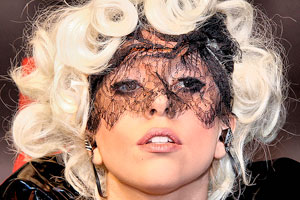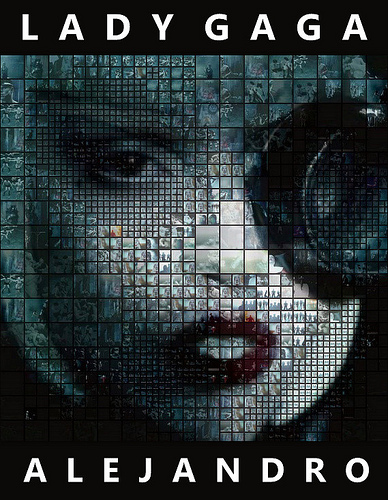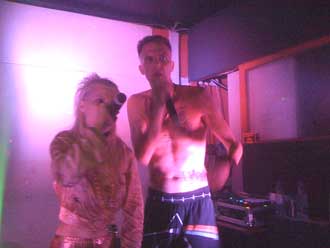
Photo by <a href="http://www.flickr.com/photos/kk/4862264079/">KK+</a> under a CC license.
Last week, I posted the first part of my interview with South African rave-rappers Die Antwoord, which means “the answer.” Talented and profane, Ninja (né Waddy Jones) and Yo-Landi Vi$$er—who have a daughter together, although they aren’t a couple—have concocted a surreal musical chemistry, tag-teaming in a hypercharged mix of English, Afrikaans, and even tribal languages.
They were largely unknown outside of South Africa until this past February, when their video for “Enter the Ninja” suddenly went viral. This launched a bidding war that culminated in a record deal and the release, this week, of $O$, their much-anticipated debut on Interscope. In the first part of our interview, which you should read, Ninja discusses the record deal and the story behind the group’s startling new “Evil Boy” video. In part two, I talked to Ninja and Yo-Landi about the meaning of zef, the documentary that changed their lives, and why they plan to kill Die Antwoord after five albums.
Mother Jones: You guys like to say that you represent South African culture. How do you view that culture?
Ninja: We like to absorb all the different elements of South Africa that we find interesting and attractive and unique. We’re like sponges. There’s things about the Xhosa culture that we love, and we love things about the Afrikaans culture; that’s very amusing and interesting to us. And then there’s the colored culture, which is a whole other thing.
MJ: That’s mixed-race?
N: Ja. They refer to themselves as coloreds, not “blacks.” The PC-version people try and promote this image of South Africa as a rainbow nation and make it all like pretty and stuff. But it’s actually like this fokked-up, kind of broken fruit salad. ‘Cause all those things don’t mix that well together in the real world. But for us it does mix. That’s why we say it’s, like, “fokked into one person.” ‘Cause that’s how we feel on a certain level. Like we absorb all these things, but they’re not harmoniously flowing together through the air in this pretty rainbow picture.
MJ: And that’s what you’re trying to project?
N: That’s our experience of being South African. But we enjoy the brokenness. Our music comes out of a very dysfunctional thing that we’re trying to make sense of with our music.
MJ: You guys get asked a lot about “zef,” which as best I can tell is kind of like “bling.”
N: Zef is South African underdog kind of style. Zef has been an insult for long in South Africa. It means you’re like a piece of shit. So not really bling. It’s seen as an embarrassment. The thing is, the word kind of started transforming about 10 years ago. It’s kind of abstract. It’s like if you look at ’70s movies, everything’s like slick and like good looking and fokken pretty and stuff. And then the ’80s everything was like, bam!—in-your-face, kind of colorful, kind of ugly. And then the ’90s came along and so many different things happened and technology started freaking out, you know? There’s Nirvana and hip-hop music and rave music, and the interweb was starting to come around and cyberpunk and all this different-style stuff. And then 2000 came and everything got like so fokken hectic. For me, this is what zef was born out of: Rap overtook country music. Everything became super too-fast-too-furious, WWF information overload. Pop music started getting fokken dumb—like the-retards-are-winning type style. And you’re sitting in this little fishing village in the bottom of the world, and it feels like almost like an apocalyptic wasteland. We’ve got like different styles, but it’s like that too-fast-too-furious, WWF lifestyle. A kid wearing a 50 Cent t-shirt in North Africa for me is fokken zef. It’s like, kind of bad, but kind of like this apocalyptic debris that we’ve stuck together. People say trashy; it’s not really trashy. It’s not having money, but still fokken having style. So we kind of embraced that.
MJ: How have Afrikaners responded? Are they scandalized?
N: At first they were totally fokken freaked out, obviously. The kids loooove us. But a lot of the older people were like, “Jesus, this is fokken terrible—like the worst representation of South Africa ever.” But at the same time, Afrikaans has been billed off as this dying language, and all of a sudden people in the overseas are trying to learn Afrikaans. Zef is the underbelly of the Afrikaans culture, but it also, like, is Afrikaans culture. We’ve kicked down the doors to the overseas and a lot of people really like us now.
MJ: The Afrikaners have this really rich history of creativity and dissent but I think a lot of Americans impulsively equate Afrikaners with apartheid and racism. Do you encounter that?
N: No, not really, because like, uhh, I’m not really a racist, so it has nothing really to do with me.
MJ: For a long time you’ve been doing variations on what you’re doing now, and you were a total unknown outside of South Africa. Then out of nowhere, “Enter the Ninja” became this worldwide sensation. Would you recall that time for me?
N: It just seemed like I was going fokken mental before. And then, when that happened, it just seemed completely normal. It was just like, thank God.
MJ: Tell me the story.
N: I’d been experimenting with different music for long. I was, like, in a rap gang. I loved rap and it was all around me. Then it got dumb. It got, like, fokken boring. Then I started doing experimental stuff and trying all different things. And then I saw this fokken documentary about a producer for Blondie. I forget his name, but my whole life—like 10 years of what I’ve been doing—this guy just fokken destroyed it in one sentence.
He was speaking to the group, to Debbie Harry and them, and he was saying, “Stop making these clever jokes and say something real that people can connect to emotionally.” And I was like, uhhhh…fok! I just realized all my fokken experimental music has got zero personal involvement. My nuts were not exposed. I didn’t put my soul on a platter, ever, in any of the music I’d made until I heard that fokken sentence. I was just fokking around with different concepts. That sentence haunted me, and I decided to throw everything that I’d ever done away and create something that’s got my heart and soul involved. I built in my mind, like, a robot—like a “Mecha” from Japanese Manga—and all of a sudden switched it on, and it was like this indestructible fokken force. I don’t know how to explain it any better than that. That was three years before Die Antwoord blew.
MJ: So Die Antwoord was happening for three years before you took off?
N: Three years. We just said, “Fok everything; let’s just do this shit!” Yo-Landi helped me find that fokken zone. Before anyone was into it, we were like, “This is the fokken answer!” I mean, we were kind of bullied by reality: There’s a group consciousness, people’s opinion, the popular opinion and shit—they are watching you. With Die Antwoord, we found a way to flip that shit around. You’re not watching a show; the show’s watching you. It’s the sum of our philosophy: Become the enemy. Do you have a wife?
MJ: Yes.
N: And a child?
MJ: Two.
N: Do you have a gun?
MJ: No.
N: If you hear a noise and someone’s broken into your house with a gun, that’s not a situation that you want to be in. And that shit happens in South Africa all the fokken time. South Africa’s, like, fokken the wild west—everyone’s got electric fences and shit—so this is something I relate to all the time. Now if someone breaks into the house, you don’t want to be the fokken victim, you want to be the master of that reality. And Die Antwoord is like the Ninja. If you break into the house that I live in, you’re pretty much fokked. Because, like, you’re not the enemy. I’m the enemy.
MJ: Okay. So, what about the chemistry of Die Antwoord do you think people find so intriguing? Because I think it goes beyond the music.
N: Yeah, It’s pretty intense. I’m not sure. I think it’s got to do with what I just said now, that zone. It was kind of obvious that this shit’s magnetic—like a punch in the face.
MJ: I think a lot of people’s first reaction is like, who the hell are these guys?
[We get cut off, then reconnect with Yo-Landi Vi$$er joining us on the line.]
MJ: Hi Yo-Landi. So we were just talking about people’s first reactions to Die Antwoord, people asking, “Who are these guys?” And, “Are they taking themselves seriously?” Because I think there’s a lot of humor in Die Antwoord. Do you see that?
YV: Ja. We’ve very funny. But we’re fokken serious.
MJ: Take the “Wat Pomp” video, for instance.
YV: That was the first video we ever made. With my friend’s little digital camera. I don’t know how I feel about it. It was the first thing we were able to put together.
N: I think Yo-Landi’s verse is quite good and my verse is a bit dumb. We should re-cut that and just have her verse and nothing else.
MJ: I wanted to ask you about the whole Ninja identity. I mean, who is it that reads your daughter her bedtime stories? Is it Waddy Jones or Ninja?
N: I changed my name to Ninja. So my daughter calls me Ninja.
MJ: Really?
N: Ja, ja ja.
MJ: Tell me a bit about her.
N: Nah. It’s kind of private, you know. She’s kind of like our little secret, so it doesn’t really got to do with anyone.
MJ: Is she the one we hear cussing on the record?
N: One of them. The other one is our little niece.
MJ: Is it true that you’ve already recorded your second album, Tension.
N: We’ve written a lot of the hooks, and it’s fleshed out quite powerfully. But it’s pop music—the hooks are fokken impossible. Writing rap is like stop-frame animation: You have to keep documenting your experience and making it interesting and pouring out. But the hooks are fokken freaks of nature. We’ve written like the majority of the meat, the hooks, the catchpods of Tension, and now we’re fleshing it out and very, very, very deeply into the musical side, marrying the catchy-ass hooks with the melodies.
MJ: It seems like it’s going to be pretty different. Can you give a preview?
N: We’re actually recording some sketches tonight, but it’s pretty much how “Enter the Ninja” jumped to “Evil Boy.” It’s like a quantum leap, but still the same group.
YV: Ja. Music for me is just about where you’re at, and that’s always changing. The second album will just be a new phase, but it will still be us.
MJ: Trying to kind of keep from getting bored, I guess?
N: We just evolve, and we like upgrading. It’s like getting the new iPhone or something. It looks the same as the old one—it’s just cooler and the battery lasts longer.
MJ: In past interviews, you said Tension will be mostly in English. Is that still the plan?
N: No. That was just ‘cuz we didn’t know that anything was going to happen with $0$. We finished it sometime in 2009, and then we started writing Tension and said, like, “Fok, how are we ever going to break outside of South Africa.” So we started putting a lot more English hooks in. We actually don’t think English vs. Afrikaans that much anymore. The Afrikaans is nice—like tapping a new gold mine of rhymes and words, and there’s a whole fokken new vocabulary. But you have to balance it.
MJ: I think one of the great things about Die Antwoord is the novelty of hearing those sounds.
YV: It makes it a bit exotic, you know, to add another flavor to it: The Afrikaans flavor. So we’ll always maintain that, but—I don’t know—it just depends on what you feel like saying and how you feel like saying it.
MJ: The way Die Antwoord is headed, Yo-Landi, it sounds like you may end up being a “rich bitch” (her alter ego) in real life. How do you suppose having money will change the way you live?
YV: Well, before anything was happening for us, me and Ninja always thought, fok! Imagine if we just had budgets to do the things we wanted to do instead of begging people for favors and scraping things together. That’s all that’s really changed for me. Our lifestyle’s kind of the same. We’re the same fokken person. We just now have a little bit of budget and we can pay our friends to help us.
MJ: What’s it been like going from total obscurity to everybody knows who you are?
YV: Not everybody knows who I am.
MJ: Everyone’s gonna know.
YV: It just feels natural. Before, we were going mental thinking, “Fok, if your art doesn’t relate, if it doesn’t take, if people don’t connect with it, there’s no point in being a fokken artist or a rapper or whatever.” And when it connects, a flow starts happening and a cycle starts happening and you get other people putting energy into you and you get to put out what you want to put out.
MJ: It’s a lot fun too, I imagine. By the way, why did you guys name your first album SOS?
YV: Because if this album didn’t make it, we were fokked!
MJ: It’s super catchy. It’s also over-the-top raunchy—especially “Beat Boy.” Do you have to hide this stuff from your parents?
N: My mum hasn’t heard any of my songs. She’s just very happy that I’m doing good.
YV: My parents were shocked at first because they’re Afrikaans, and obviously all the Afrikaans swearing was very brusque to them at first. But now they’re getting into it as well, and I find them every now and again bumping one of our songs secretly in their room!
N: I made a clean version of “Enter the Ninja” that my mom can listen to.
MJ: But you’re probably not feeling it so much, are you?
N: I don’t mind the Wal-Mart version. The vibe’s there. In Japan, they don’t understand fokken one word we’re saying and they’re feelin’ it. So there’s like a mood transfer happening, which is the main thing, I think.
MJ: You’ve talked about this plan to do five albums and then game over. Is that true?
N: Yep.
MJ: So you’re kind of like drawing a circle around Die Antwoord’s career in advance?
N: Ja, ja, ja.
MJ: Why do that?
N: Because…Well, you know Michael Jordan?
MJ: Yeah, yeah.
N: Then you know he retired, like, as a god and then he came back as a man.
MJ: Yeah?
N: We ain’t going out like that.
Click here for more Music Monday features from Mother Jones.

















